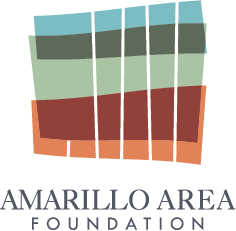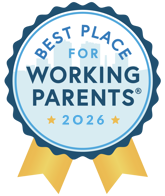
Amarillo Area Foundation is proud to share the recipients for the first cycle of the 2024 Discretionary Grants. This grant cycle included proposals in all three of our focus areas—Education, Health, and Economic Opportunity. These organizations are continuing the important work that is our mission: improving the quality of life for Texas Panhandle residents. Over $1,787,075 was granted in this cycle. Thank you to these organizations!

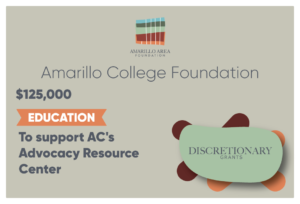
The Advocacy and Resource Center (ARC) is a cornerstone of the No Excuses Poverty Initiative at Amarillo College (AC). The ARC seeks to help AC’s disadvantaged students meet their current educational goals while removing barriers that hinder completion. It has five key components: (1) a central location on AC’s main campus; (2) a plethora of on-campus services such as the food pantry, a clothes closet, access to computers, support in applying for public benefits, assistance with childcare and transportation, tuition support, and referrals to other campus resources such as counseling and legal assistance; (3) a team of social workers dedicated to implementing the ARC’s programs and services; (4) a network of Amarillo-based agencies and organizations that students can be referred to for additional assistance; and (5) emergency aid through the No Excuses Fund.
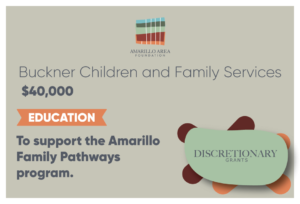
Amarillo Family Pathways is a two-generation transitional program for single mothers and their families who lack the resources to meet their basic needs. The program allows the parent to complete a higher education degree or vocational/technical certificate. At the same time, the family lives in safe, affordable housing and works together to build on their strengths. A Family Coach (case manager) assists the family with developing a self-sufficiency plan designed to overcome any barriers to program completion.
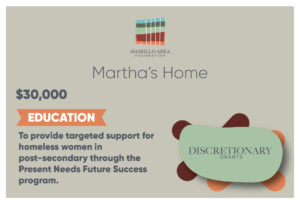
Martha’s Home believes that through the “Present Needs and Future Success” program the cycle of poverty and homelessness can be broken through education. While education is a powerful tool, Martha’s Home recognizes poverty and homelessness require a multi-faceted approach that includes education, social policies, affordable housing, mental health support, and employment opportunities. By removing the barriers that prevent residents from completing a GED, a certificate, or a degree, individuals can obtain a livable wage, become productive citizens, and support their families without social assistance.
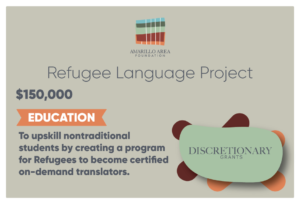 The Refugee Language Project (RLP) has led the Amarillo community with innovative and effective services for the local refugee population. RLP has a history of listening and being responsive to the community’s needs and has leveraged its areas of expertise in language and relationship building to create effective solutions. This project will create a certification pathway that is needed and not currently available for minority language speakers while also providing a sustainability source for RLP. Additionally, it will allow minority language speakers in our community to access critical emergency, legal, educational, and social services.
The Refugee Language Project (RLP) has led the Amarillo community with innovative and effective services for the local refugee population. RLP has a history of listening and being responsive to the community’s needs and has leveraged its areas of expertise in language and relationship building to create effective solutions. This project will create a certification pathway that is needed and not currently available for minority language speakers while also providing a sustainability source for RLP. Additionally, it will allow minority language speakers in our community to access critical emergency, legal, educational, and social services.
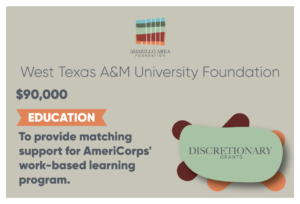
A community-driven project to expand work-based learning opportunities for rural youth and encourage collaboration and engagement through community partnerships. This project aims to work toward increasing educational attainment, improving workforce readiness, meeting regional needs, and building resilient individuals and communities in the Texas Panhandle.

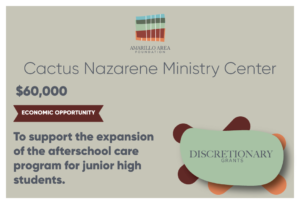
Cactus Nazarene Ministry Center (CNMC) offers an afterschool program in collaboration with Cactus Elementary School 3 days a week for two hours a day at no cost to families in need. The programming addresses teaching English, tutoring/homework assistance, healthy snacks, arts and crafts, and physical education. Almost 100% of the families are low-income. CNMC would like to expand the after-school program to allow more children to attend. Many middle school children visit the center at other hours to receive support for their schooling since many of their parents do not have formal education or speak English. The goal is to offer the middle school youth a formal program.
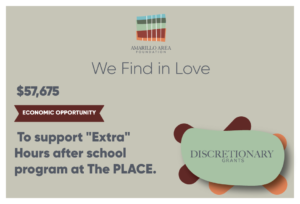
The PLACE, a multicultural community center with a refugee focus in Amarillo, has become the hub for children of all ages after school and afternoons on non-school days. While this program was born out of necessity, serving over 40 children in Amarillo’s highest refugee/immigrant population section. “Extra Hours” will provide more resources to better help their young friends from many nations like Afghanistan, Myanmar, and Africa, who now call Amarillo Home.

The RANGE is an industry-led organization in the Texas Panhandle, driving innovation in the beef, dairy, and crop and energy production industries. The RANGE addresses water and environmental stewardship challenges, automation and labor upskilling, and data management. Leveraging the region’s expertise, research base, and workforce

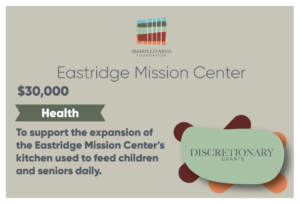
The Eastridge Mission Center (EMC) kitchen project addresses food insecurity in Northeast Amarillo, primarily in the Eastridge neighborhood. The EMC serves food to those who are in need. Kids and teens come to the EMC after school for a free meal, courtesy of the High Plains Food Bank. The Kids Cafe meals are premade, but EMC uses their kitchen appliances to warm the food in warming trays and cool in the refrigerator. EMC uses its kitchen to cook and prepare the kids’ meals for holidays, special events, and summer day camps. The senior citizens who are delivered food are also struggling to access food. The EMC started Kingdom Seniors in 2022, where volunteer delivery drivers take food to the doorsteps of older adults each weekday afternoon. The underserved area’s youth and seniors enjoy having a daily meal. The EMC also has a community garden where fresh fruit and veggies are given to those in need. The garden produces a great harvest, and EMC washes and stores the produce in the EMC refrigerators until delivery.
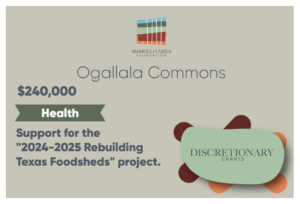
Ogallala Commons (OC) shares Amarillo Area Foundation’s impact goals of increasing food security through comprehensive, community-based solutions in the Texas Panhandle. OC is committed to addressing systemic deficiencies by developing and strengthening a coalition to improve community health and increase the quality of life. In addition to coalition building, they aim to increase access to local foods in rural communities by supporting the producers. This work builds the capacity of producers, increases their long-term viability, and ultimately ensures that an increasing amount of locally produced food is available in our communities. Coupling producer support with community education regarding the availability and utilization of locally produced, fresh, nutrient-dense food options increases a community’s capacity to support the increasing volume of local food.
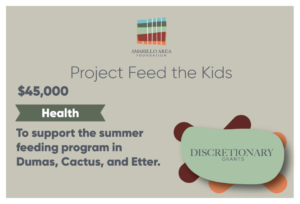
Once schools conclude their lunch distributions, Project Feed the Kids springs into action! Throughout July and August, Project Feed the Kids provides complimentary lunches to children. Each lunch includes a warm main dish, a packet of chips, fresh fruit, a dessert, and a beverage. Project Feed the Kids tackles food insecurity among children in Moore County, Texas, specifically in Dumas, Cactus, and Etter. This is achieved by offering complimentary meals on weekdays (M-Th, SP4K on F) throughout the summer, ensuring they can access nourishing food when school meals are unavailable.
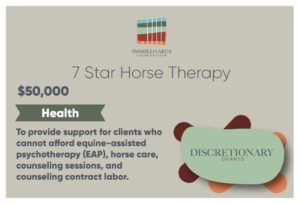
Supporting equine-assisted psychotherapy sessions will help clients realize early on when they need to see a counselor to get mental health screening and services. EAP services differ due to incorporating horses and horse interactions into a client’s sessions. Horses give a unique biofeedback to help the client understand their emotions through the horse so they can better use their feelings in the world.
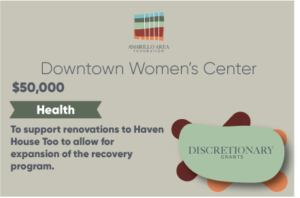
Downtown Women’s Center (DWC) serves adult women with substance use disorder and their children by providing a two-year and often longer-supported Level-9 Recovery Program, including housing and wrap-around services to ensure long-term sobriety and stability. DWC uses a holistic approach to recovery and believes that when individuals seek help, they can, in time, live clean, sober, contributing lives. DWC offers hope, coupled with practical resources for changing lives. As part of their mission, DWC oversees three shelters (Haven House, Abba House, and Gratitude House), operates three retail thrift stores (Thrift City, Thrift City Too, and Uptown Shoppe – all on 10th Street in Amarillo), and manages the Meridian Apartments, offering quality, affordable housing for 35 lower-income or disabled residents.
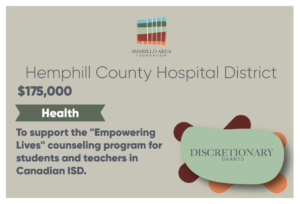
The Empowering Lives initiative strives to sustain on-campus counseling sessions, fostering a supportive environment for students within Canadian ISD (CISD). This initiative extends to providing tailored counseling sessions designed explicitly for CISD teachers. Understanding and empathizing with the challenges they face in the post-pandemic landscape has led to heightened levels of burnout, diminishing their capacity to support students. Regrettably, teachers often neglect themselves and don’t receive the necessary behavioral health support. This funding will directly cover the services of a highly qualified and licensed counselor, ensuring availability throughout the 2024-2025 school year and the subsequent summer.
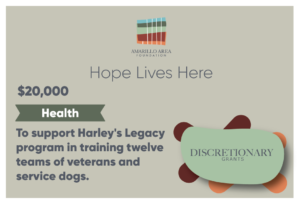
Veterans returning from combat face a myriad of issues as they learn to acclimate to civilian life. Sadly, many have difficulty with this adjustment, which leads to higher rates of divorce, joblessness, substance abuse, homelessness, and suicide. 22 Veterans die by suicide daily: that’s one death every 1 hour and 20 minutes. PTSD affects 53% of Veterans. 1 in 6 women and 1 in 29 men have experienced MST. Over 500,000 returning vets suffer from TBI, major depression disorders, or chronic pain. Symptoms include anxiety, nightmares, panic attacks, insomnia, mistrust, eating disorders, anger, fatigue, depression, and suicidal thoughts. A service dog is trained to perform specific tasks for the handler that they cannot do because of a disability. The mission of Hope Lives Here is to help our military men and women live the full and rich lives they want and deserve and give unwanted dogs an essential job. When our Veterans return from serving our country, let’s ensure we are ready to serve them.
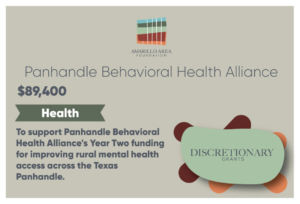
Panhandle Behavioral Health Alliance (PBHA) serves the role of a catalyst and capacity builder for our region to “precipitate/encourage/cause/transform” change. We examine the root causes of complex systemic problems and design solutions to “raise the tide for all boats” in our community. This project will focus on addressing Provider Shortages (i.e., improve the recruitment and retention of clinical providers while focusing on local workforce development), Rural Access with better coordination and collaboration of activities and services in the Texas Panhandle region as well as provide consultation to rural communities and organizations; Education to both community members and providers to address early intervention and improved health outcomes. This will align with AAF’s focus on rural/regional impact and improved mental health access by addressing provider shortages and early intervention.
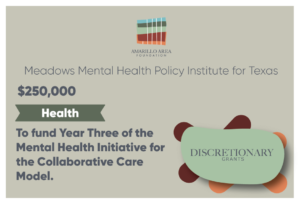
This project aligns with the goals of the Amarillo Area Foundation by putting transformative solutions into practice to improve the quality of life for Texas Panhandle residents. Through this initiative, AAF will extend its reach and expedite the impact of early identification and treatment of depression in the Texas Panhandle communities. The project is driving primary care-based clinical solutions across leading health systems. Through an innovative, collaborative framework, the project seeks to provide care for untreated depression in the same manner that healthcare/the medical field strives to eliminate other illnesses.
The AAF partnership in this project is a commitment to helping end untreated depression. This partnership is essential in improving the lives of the Texas Panhandle residents suffering from this disease.
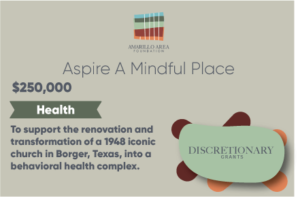
In a visionary effort to address the pressing need for behavioral health services in rural communities, Aspire proposes renovating and transforming a 1948 iconic church in Borger, Texas, into a behavioral health complex. The 17,000 sq ft historic building will be revamped to offer direct care and telehealth rooms, counseling offices, group therapy spaces, and community engagement areas, all while preserving its architectural charm. This initiative aims to increase accessibility to mental health services, reduce stigma, and provide holistic care in a stigma-free environment. This is not just a renovation project; it’s a testament to the power of community-driven initiatives. By repurposing this cherished church building, they aspire to create a space where individuals find solace, strength, and the support they need on their journey toward mental well-being. Together, we can turn a piece of history into a beacon of hope, healing, and resilience for Borger and surrounding areas.
